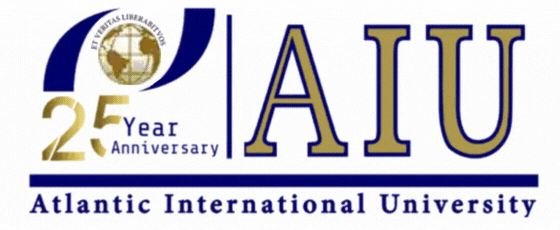- RESEARCHDistance Learning at AIU is enhanced by vast academic resources and innovative technologies build into the Virtual Campus: Hundreds of self-paced courses with video lectures and step by step lessons, thousands of optional assignments, 140,000 e-books, the Social Media & Networking platform allowing collaboration/chat/communications between students, and MYAIU develop students holistically in 11 areas beyond just academics.
- PROGRAMS OFFERED
- Areas of Study
- Courses and Curriculum
- Open Courses
- Register for a Program
- Associate Program
- Associate in Addiction Counseling
- Associate in Agriculture Food And Resources
- Associate in Anti Terrorism Security
- Associate in Behavior Analysis In Special Education
- Associate in Bioethics
- Associate in Climatology
- Associate in Cultural Theological Communication
- Associate in Culinary Arts
- Associate in Ecotechnology
- View all Associates Programs
- Bachelor Program
- Bachelors in Community Development
- Bachelors in Environmental Science
- Bachelor in Education (B.Ed, BS)
- Bachelors in Economics
- Bachelors in Entrepreneurship
- Bachelors in Financial Administration
- Bachelors in Human Resource Management
- Bachelors in Linguistics
- Bachelors in Nutritional Science
- Bachelors in Occupational Health and Safety
- Bachelors in Psychology
- View all Bachelor Programs
- Doctorate Program
- Doctor | of Biology (PhD)
- Doctorate in Business Administration (DBA, PhD)
- Doctor of Economics (PhD)
- Doctor of Electrical Engineering (D.Sc, PhD)
- Doctor of Finance (PhD)
- Doctorate in International Relations
- Doctorate in Information Technology (D.Sc)
- Doctor of Legal Studies (PhD)
- Doctor of Project Management (PhD)
- Doctor of Sociology (PhD, D.Sc)
- Doctorate in Sustainable Natural Resources Management
- View all Doctorate Programs
- Master Program
- Postdoctoral Program
- Postdoctoral in Animal Science
- Postdoctoral in Anti Terrorism Security
- Postdoctoral in Behavior Analysis In Special Education
- Postdoctoral in Bioethics
- Postdoctoral in Blockchain Technology and Digital Currency
- Postdoctoral in Business Management
- Postdoctoral in Cloud Computing
- Postdoctoral in Computer Engineering
- View all Postdoctoral Programs
AIU offers a wide range of majors in areas including the Arts, Business, Science, Technology, Social, and Human studies. More than 120 degrees and programs are available for adult learners at the associate’s, bachelor’s, master’s, doctoral and postdoctoral level. - VIRTUAL CAMPUS
Distance Learning at AIU is enhanced by vast academic resources and innovative technologies build into the Virtual Campus: Hundreds of self-paced courses with video lectures and step by step lessons, thousands of optional assignments, 140,000 e-books, the Social Media & Networking platform allowing collaboration/chat/communications between students, and MYAIU develop students holistically in 11 areas beyond just academics.
- ALUMNI
The world is YOUR campus!”, that is the message of AIU’s month magazine Campus Mundi. Hear the voices and see the faces that make up AIU. Campus Mundi brings the world of AIU to you every months with inspirational stories, news and achievements by AIU members from around the world (students and staff are located in over 200 countries).
Un’s Sustainable Development Goal 12: Responsible Consumption and production
UN Sustainable Development Goal 12: Responsible Consumption and Production
UN Sustainable Development Goal 12 focuses on promoting responsible consumption and production patterns to enhance resource efficiency, reduce waste, and improve quality of life. It aims to decouple economic growth from environmental degradation, support sustainable practices, and alleviate poverty, ultimately fostering a more sustainable future for all by 2030.

The UN Sustainable Development Goal 12 emphasizes the importance of responsible consumption and production as a means to promote sustainable practices globally. This goal aims to enhance resource and energy efficiency, develop sustainable infrastructure, and ensure access to basic services, ultimately improving the quality of life for all individuals.
The implementation of SDG 12 is crucial for achieving broader development plans, as it helps to reduce future economic, environmental, and social costs. It strengthens economic competitiveness and plays a significant role in poverty reduction. The UN has established 11 specific targets and 13 indicators to measure progress towards this goal. The targets outline the objectives, while the indicators serve as metrics to track the achievement of these targets.
One of the primary objectives of SDG 12 is to ensure sustainable consumption and production patterns. This requires urgent action to reduce the ecological footprint by transforming the ways goods and resources are produced and consumed. Agriculture, for instance, is the largest user of water globally, with irrigation accounting for nearly 70 percent of all freshwater used by humans. Efficient management of natural resources and the elimination of toxic waste and pollutants are essential targets for achieving this goal.
Encouraging industries, businesses, and consumers to recycle and minimize waste is vital, as is supporting developing countries in transitioning to more sustainable consumption patterns by 2030. A significant portion of the global population still consumes insufficient resources to meet their basic needs, highlighting the need for improved efficiency in production and supply chains. This shift is crucial for enhancing food security and fostering a resource-efficient economy.
The current state of global consumption and production relies heavily on the exploitation of natural resources, leading to environmental degradation that threatens future development and survival. For example, approximately one-third of all food produced—around 1.3 billion tonnes valued at $1 trillion—ends up wasted due to poor practices in transportation and harvesting, or simply rotting in bins. Transitioning to energy-efficient technologies, such as light bulbs, could save the world an estimated $120 billion annually.
The COVID-19 pandemic presents an opportunity for countries to develop recovery plans that can reverse negative trends and promote sustainable consumption and production patterns. Achieving SDG 12 involves doing more with less, decoupling economic growth from environmental harm, increasing resource efficiency, and promoting sustainable lifestyles. Ultimately, sustainable consumption and production can significantly contribute to poverty alleviation and the transition towards low-carbon, green economies.
Atlantic International University
Get to know the AIU experience
Contact Us Today!
We understand how busy adults do not have time to go back to school. Now, it’s possible to earn your degree in the comfort of your own home and still have time for yourself and your family. The Admissions office is here to help you, for additional information or to see if you qualify for admissions please contact us. If you are ready to apply please submit your Online Application and paste your resume and any additional comments/questions in the area provided.
Pioneer Plaza
900 Fort Street Mall 905
Honolulu, HI 96813
800-993-0066 (Toll Free in US)
808-924-9567 (Internationally)
808-947-2488 (Fax)
AIU Success Stories







Contact Us Today!
Begin Your Journey!
AIU’s Summer of Innovation and Growth gives you the ability to earn up to $5000 in tuition credit by completing free lessons and courses.
Whether you’re looking to acquire new skills, advance your career, or simply explore new interests, AIU is your gateway to a world of opportunities. With free access to 3400 lessons and hundreds of courses the ability to earn credits and earn certificates there’s no better time to start learning.
Join us today as a Guest Student and take the first step towards a brighter, more empowered future.
Explore. Learn. Achieve.
Degrees

Contact Us
Atlantic International University
900 Fort Street Mall 905 Honolulu, HI 96813 [email protected]
Quick Links
Home | Online Courses | Available Courses | Virtual Campus | Career Center | Available Positions | Ask Career Coach | The Job Interview | Resume Writing | Accreditation | Areas of Study | Bachelor Degree Programs | Masters Degree Programs | Doctoral Degree Programs | Course & Curriculum | Human Rights | Online Library | Representations | Student Publication | Sponsors | General Information | Mission & Vision | School of Business and Economics | School of Science and Engineering | School of Social and Human Studies | Media Center | Admission Requirements | Apply Online | Tuition | Faculty & Staff | Distance Learning Overview | Student Testimonials | AIU Blogs | Register for Program | Privacy Policy | FAQ



















